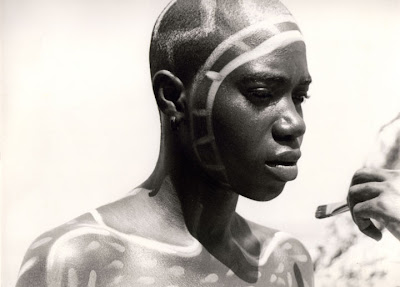 1) What the fuck is going on?
1) What the fuck is going on?
life in 3s. I turn 30 in december. I have a 3-year-old son. I have my 3rd book (rivers and other blackness between us) coming out before my birthday. finishing up a trilogy of plays (3 faces of mudgu sankofa – last play is a commission from soulpepper, a dub opera called word! sound! powah!). I am currently resting my soul in akra ghana. everything about my life is changing. I am deeply content.
2) How does your background in dub poetry inform your approach to writing for theatre?
dub is rooted in oral storytelling tradishuns that enslaved afrikan peoples brought to the americas. the main elements of dub are 1. language 2. political content (simply meaning ‘of the people’) 3. musicality 4. orality. when I write for theatre, these are the elements that make up my foundation, therefore my work is rooted in issues that concern the many communities that I belong to as a womban, as an afrikan, a mother, as an artist, as a queer-identified person, as a working person, an able-bodied person, etc. engaging the audience is essential in communicating the story with them so it permeates the head and eventually rests in the heart. music and rhythm and humour and honesty are good for that. the elements that I use to engage the audience as a dub poet are the same elements I use to engage the audience as a playwright.
3) How have you developed as an artist since joining the Soulpepper Theatre Academy as artist-in-residence?
the biggest lesson I learnt was how to sit still and listen. how to be disciplined and listen. how to be in a group and listen. listening, I have realized is one of our most integritous revolushunary tools and if your aim in life is to be a part of inevitable social change then listening is one of the biggest assets you can have. during my time in the academy I learnt both to listen to the community we created there and to listen to myself.
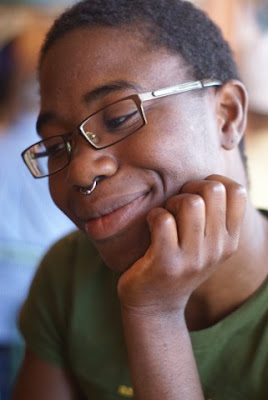 4) How well are Black Canadians being served by and represented in contemporary Canadian theatre?
4) How well are Black Canadians being served by and represented in contemporary Canadian theatre?
what is contemporary theatre? If you mean the mainly publicly funded, mainly media supported, medium-to-large theatre houses, clearly there are not many black people (meaning womben and men, however womben especially), or first nations people or many other people of colour or differently abled people). the reason for this is clear – longstanding legacies of colonialism and imperialism (racism, sexism, classism, etc) dating back to the very stealing of canada from first nations people.
that being said, my own understanding of contemporary theatre is theatre that is being created now, today, which is happening all over; which does get some media support. If this is what you mean then I definitely feel that black canadians are both being served and represented because we are creating our own theatre and have been since we have been in canada, both as enslaved afrikans brought over on ships and as new immigrants choosing to come here voluntarily.
I am becoming less pre-occupied with being served by the former definition of ‘contemporary canadian theatre’ and more concerned with creating it. I feel that that is one of the solutions I can offer. therefore I feel that indeed in creating the stories that I am telling, I am serving canadians and am representing myself.
a major part of the reality is that as human beings we seldom relinquish power or share it simply because that is the ‘right’ thing to do. usually something has to be at stake or a gain on the part of the power-holder has to be identified. for me this has always meant removing myself from scenarios that may compromise my ability to have power over myself. Self-determination is essential in identity, self-esteem and community building.
I feel that as people in general we are responsible for telling our own stories and creating the means by which to tell them. there are some serious concerns around funding and access, however like I said these will not disappear over night so what do we do in the mean time? wait? no. we create. we live. we dialogue. we change ourselves and our families and our lovers and our friends. and we do not give up our power over self by waiting for power holders to share power. we simply create another reality in which we can find self-empowerment and positive self-reflection and collective dialoguing about change; tell our own stories. I am also less concerned about having these dialogues in the vacuum of acting/writing for theatre and more concerned with having them across broad socio-political-economic circles because these systems are old and entrenched so changing them needs a complex inter-connected circular approach.
5) How important is it for artists to be actively challenging systems of oppression with their work?
artists are responsible for honouring the sacred in our present-day societies. people and our livelihoods are sacred. I feel that if the work we create is truly for the people then we can’t avoid asking questions about our present state of being (globally, nationally, locally, personally). No-one likes to be hurt, left out, disregarded, disrespected, used, abused, not celebrated, etc. being loved, admired, celebrated, challenged, inspired, having food, a roof, safety, etc. that shit feels good. so if this is true, and we look around at our world, it’s inevitable that some serious questions will be asked. the artist decides what questions, what style to ask the questions in, what characters through, etc. but the questions will be posed and maybe even some answers. this is largely how I choose as an artist to get involved in challenging systems of oppreshun. however it is crucial that I enjoy my life; my own happiness and the work that I do go hand in hand. I do not enjoy working in an environment that does not help me to feel inspired and to feel that life is worth living, so this kind of work needs to stoke the fire of life and for me, it does that.
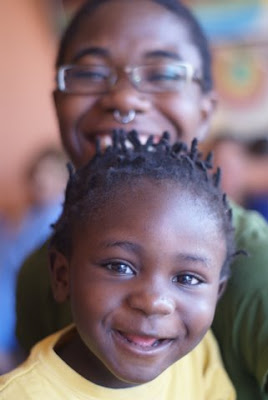 6) How much of your work is informed by a sense of anger?
6) How much of your work is informed by a sense of anger?
anger is very important in my work, especially when it can be transformed into inspiration. anger is an emotion that can tell you when a situation is very wrong and if channeled carefully can lead to some amazing questions. for my own process, anger has always been a gem. in my most angered moments I have learnt so much about myself, so much about the ways in which I am growing and all the room I have left to grow. I have also learnt about my ability to be courageous in the face of ostracization. mostly, when I have looked deeply at my anger I have realized that it masked a deeper hurt and pain. so my anger has also taught me about my humanity. and in turn about other people’s humanity. as artists it is also our business to deeply investigate the ways people’s humanities (womb)manifest. I use anger in my work both to inform characters and to inform subject matter.
7) What is your fondest memory of being on stage?
at 13 I was cast as one of the soldiers in kamau braithwaithe’s adaptation of antigone titled odale’s choice. about 2 weeks into the rehearsal process I was recast as odale (antigone). I remember praying over my brother’s dead body on the mountain-side and trying so hard to do him justice, do the performance justice, and also to project my voice for the thousands of Jamaican secondary-school-aged children in the audience. I ended up screaming and loosing my voice. that was the happiest moment of my childhood life. It’s when I knew I was to be a storyteller.
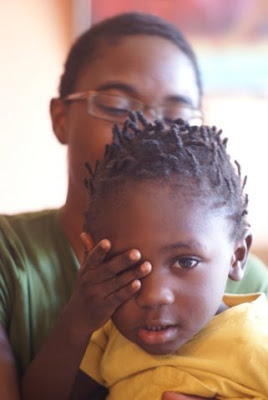 8) What does the word “womban” mean to you?
8) What does the word “womban” mean to you?
we are all from the womb of someone. me too, I am from the womb of my mother and I never want to forget that. as opposed to the creation myth of being from the rib of someone.
9) If you could change just one thing about theatre in Canada, what would it be?
the proscenium box stage approach with the ever-present fourth wall. we’d all do it in the round or do it in the triangular with the tip to the audience, like the passe muraille stage we used for blood.claat. that was a brilliant and poetic concept. and we’d have to acknowledge the audience at some point during the story. maybe this approach could be a constant reminder that theatre is storytelling for and about the people. us.
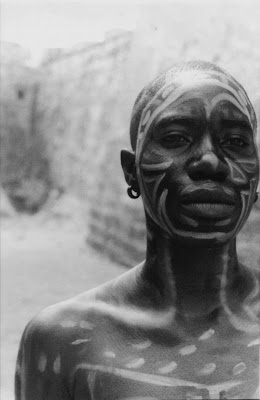 10) What can North American theatre makers learn from the way artists are working in Ghana?
10) What can North American theatre makers learn from the way artists are working in Ghana?
one of the adinkra symbols from ghana is called sankofa, which translates to ‘return and get it’ or ‘learn from the past’. for us as canadian theatre makers, to move into the future we must learn from the past. there are some dialogues we need to have about canada’s past that we are unwilling to have. but if we don’t have them how can we hope to do different, do better for our children’s future and the seven generashuns to come?
GREAT INTERVIEW!
Great questions, great answers. I love your favorite theater memory of being on stage and then losing your voice. I think it’s very powerful.
Thank you for sharing. I felt grumpy this morning, now I feel inspired.
And your daughter is beautiful!
Meredith
ommmm wow. holy wow. fantastic interview.
my favourite part:
there are some serious concerns around funding and access, however like I said these will not disappear over night so what do we do in the mean time? wait? no. we create. we live. we dialogue. we change ourselves and our families and our lovers and our friends. and we do not give up our power over self by waiting for power holders to share power. we simply create another reality in which we can find self-empowerment and positive self-reflection and collective dialoguing about change; tell our own stories.
yes. thank you very much for reminding us about that d’bi. i think a lot of independant artists walk around thinking something similar, but it’s nice to see it so beautifully and articulately phrased.
I agree Meredith.
And it’s not just the content that’s inspiring me, but the form, too. The use of lower case letters, for example, where typographic convention dictates that a capital be used (but not, you’ll notice, in the case of “I”). And the careful and consistent re-spellings of some words. All of this strikes me as a deeply considered recontextualization – a tangible and inviting solution for moving past the power structures that bind us in so many ways (to capitalism, strict gender roles, race, etc.). That d’bi is able to suggest this revolution without alienating her audience is a big part of the beauty of these ideas, in my opinion.
“there are some dialogues we need to have about canada’s past that we are unwilling to have. but if we don’t have them how can we hope to do different, do better for our children’s future and the seven generashuns to come?”
Glark. Blrble. Snzzk. Brain fried. Didn’t expect to have my mind blown with coffee this morning. What a beautiful, elegant piece of discussion. That’s what I’m talking about with this series, crazy inspiration. Too much to comment on, and nothing needs to be, not by me anyway. I’m in love.
“…to be a part of inevitable social change then listening is one of the biggest assets you can have.”
“we simply create another reality in which we can find self-empowerment and positive self-reflection and collective dialoguing about change”
“artists are responsible for honouring the sacred in our present-day societies.”
“the artist decides what questions…”
Sigh.
What? I mean, what? This is a trite rehash of some multicultural playbook:
“what is contemporary theatre? If you mean the mainly publicly funded, mainly media supported, medium-to-large theatre houses, clearly there are not many black people (meaning womben and men, however womben especially), or first nations people or many other people of colour or differently abled people). the reason for this is clear – longstanding legacies of colonialism and imperialism (racism, sexism, classism, etc) dating back to the very stealing of canada from first nations people.”
The only thing more maddening than that unoriginal garbage is Ian’s post:
“And it’s not just the content that’s inspiring me, but the form, too. The use of lower case letters, for example, where typographic convention dictates that a capital be used (but not, you’ll notice, in the case of “I”). And the careful and consistent re-spellings of some words. All of this strikes me as a deeply considered recontextualization – a tangible and inviting solution for moving past the power structures that bind us in so many ways (to capitalism, strict gender roles, race, etc.). That d’bi is able to suggest this revolution without alienating her audience is a big part of the beauty of these ideas, in my opinion.”
What? Ridiculous…or ridikulus or ridiqulus.
It’s easy to call bullshit on other people’s ideas when you don’t bother to offer any of your own.
And then signing it “Anonymous.”
How about contributing to the dialogue rather than putting down people who are?
Thanks,
Ian
yep. i’m with ian on this one. call bullshit on whatever you want. this blog shouldn’t be a love in where we all tell each other how wonderful we are, but doing it anonymously – sans any of your own ideas- wreaks of insecurity and cowardice.
michael wheeler